反义疑问句语法归纳与练习
反义疑问句详解及练习和答案
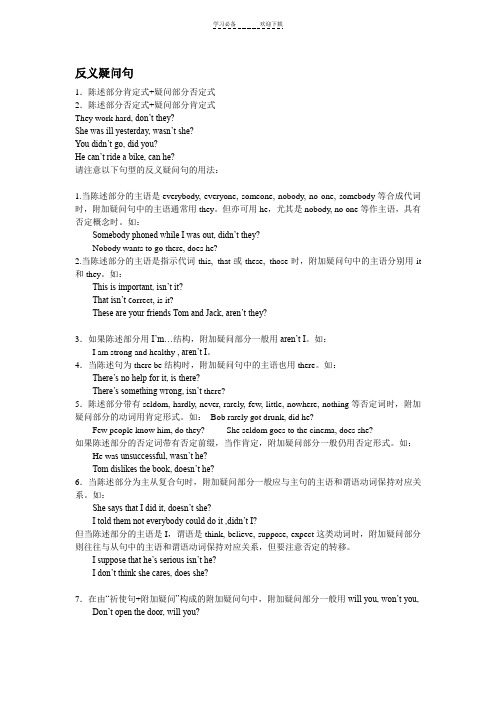
反义疑问句1.陈述部分肯定式+疑问部分否定式2.陈述部分否定式+疑问部分肯定式They work hard, don’t they?She was ill yesterday, wasn’t she?You didn’t go, did you?He can’t ride a bike, can he?请注意以下句型的反义疑问句的用法:1.当陈述部分的主语是everybody, everyone, someone, nobody, no one, somebody等合成代词时,附加疑问句中的主语通常用they。
但亦可用he,尤其是nobody, no one等作主语,具有否定概念时。
如:Somebody phoned while I was out, didn’t they?Nobody wants to go there, does he?2.当陈述部分的主语是指示代词this, that或these, those时,附加疑问句中的主语分别用it 和they。
如:This is important, isn’t it?That isn’t c orrect, is it?These are your friends Tom and Jack, aren’t they?3.如果陈述部分用I’m…结构,附加疑问部分一般用aren’t I。
如:I am strong and healthy , aren’t I。
4.当陈述句为there be结构时,附加疑问句中的主语也用there。
如:There’s no help for it, is there?There’s something wrong, isn’t there?5.陈述部分带有seldom, hardly, never, rarely, few, little, nowhere, nothing等否定词时,附加疑问部分的动词用肯定形式。
反义疑问句句知识点+习题

反义疑问句一、学习反意疑问句,特别要注意的问题1)陈述部分的主语是this, that时,疑问部分的主语多用it;陈述部分的主语是these, those时,疑问部分的主语多用they如:This is a dictionary, isn’t it?Those are shelves, aren’t they?2)陈述句如果是there be结构时,疑问句部分仍用there。
如:There once was a man named Saint Nicholas, wasn’t there?3)在英语口语中,“I am +表语结构”,后面的反意疑问句多用aren’t I来体现。
如:I am very interested in learning English, aren’t I?4)陈述句的主语是动词不定式,动词的-ing形式或从句时,疑问部分的主语多用it来体现。
如:Taking care of our environment is very important, isn’t it?What he said is right, isn’t it?5)陈述句中含有not, no, hardly, neither, never, few, little, too …to等否定词或具有否定意义的词时,疑问部分常用肯定形式。
如:Few people knew the news, did they?Tom has never been to England , has he?但陈述句中如果带有否定意义的前缀和后缀的单词时,整个句子仍视为肯定句,反意疑问部分多用否定形式。
如:She is unhappy, isn’t she?6)陈述句的主语是nobody, no one, everyone, somebody等不定代词时,反意疑问部分的主语多用they (当强调全体时)或he(当强调个体时)。
如果陈述句的主语是something, nothing, anything, everything 等不定代词时,反意疑问部分的主语多用it。
反义疑问句的用法归纳及习题

反义疑问句的用法归纳及习题反义疑问句是英语语法中的常用句型之一,它由一个肯定或否定的陈述句和一个所加的疑问句构成。
通过反义疑问句的使用,我们可以在表达思想观点时增强语气,提出问题的同时向对方确认自己的观点。
本文将介绍反义疑问句的用法,并提供相应的习题供读者进行练习。
一、反义疑问句的构成反义疑问句由两个部分组成:一个陈述句和一个疑问句。
陈述句通常是一个完整的句子,而疑问句则是一个简化的疑问句。
1. 如果陈述句是肯定句,则疑问句部分用否定形式;例如:- They are from China, aren't they?- You can swim, can't you?2. 如果陈述句是否定句,则疑问句部分用肯定形式;例如:- He doesn't like coffee, does he?- They haven't arrived yet, have they?二、反义疑问句的用法1. 确认对方的观点或陈述:当说话人对对方的陈述持怀疑态度时,可以使用反义疑问句来进行确认。
例如:- You haven't seen the movie, have you?- You don't like ice cream, do you?2. 请求对方的帮助或征求对方的意见:当说话人需要对方给予回应或意见时,可以使用反义疑问句来婉转地提出请求。
例如:- It's a beautiful day, isn't it? (期待对方赞同这个说法)- This problem is difficult, isn't it? (希望对方给予帮助或建议)3. 表达自己的观点或感受:反义疑问句也可以用来表达自己的观点或感受,并期待对方与自己保持一致或不一致。
例如:- She is a talented singer, isn't she?- You're not feeling well, are you?三、习题练习以下是一些习题,供读者练习反义疑问句的用法。
反义疑问句的练习题与语法规则梳理
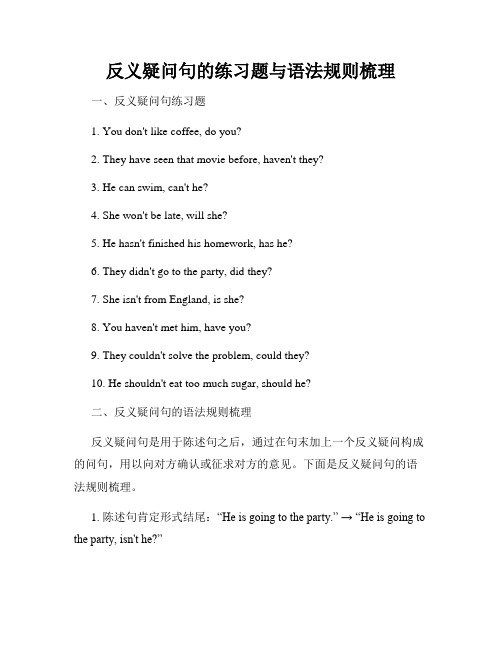
反义疑问句的练习题与语法规则梳理一、反义疑问句练习题1. You don't like coffee, do you?2. They have seen that movie before, haven't they?3. He can swim, can't he?4. She won't be late, will she?5. He hasn't finished his homework, has he?6. They didn't go to the party, did they?7. She isn't from England, is she?8. You haven't met him, have you?9. They couldn't solve the problem, could they?10. He shouldn't eat too much sugar, should he?二、反义疑问句的语法规则梳理反义疑问句是用于陈述句之后,通过在句末加上一个反义疑问构成的问句,用以向对方确认或征求对方的意见。
下面是反义疑问句的语法规则梳理。
1. 陈述句肯定形式结尾:“He is going to the party.” → “He is going to the party, isn't he?”陈述句否定形式结尾:“She doesn't like ice cream.” → “She doesn't like ice cream, does she?”2. 主语为第一人称(I)的陈述句,反义疑问句中要使用“will”,“shall”或“can”来表示征求对方的建议或请求,且要将主语换为“you”。
“I can help you,can't I?”3. 当陈述句中含有“Let's”时,反义疑问句中的主语变为“shall we”。
反义疑问句详解及练习和答案

反义疑问句(前肯后否或前否后肯,疑问部分用逗号隔开)即附加疑问句。
它表示提问人的看法,没有把握,需要对方证实。
它表示提问人的看法,没有把握,需要对方证实。
反义疑问句由两部分组成:前一部分是一个陈述句,后一部分是一个简短的疑问句,两部分的人称时态应保持一致。
1.陈述部分肯定式+疑问部分否定式2.陈述部分否定式+疑问部分肯定式They work hare, don’t they?She was ill yesterday, wasn’t she?You didn’t go, did yo u?He can’t ride a bike, can he?请注意以下句型的反义疑问句的用法:1.当陈述部分的主语是I,而句子又用来征询对方的意见时,附加疑问句中的主语用you。
如:I find English very interesting, don’t you?I don’t like that film, do you?2.当陈述部分的主语是everybody, everyone, someone, nobody, no one, somebody等合成代词时,附加疑问句中的主语通常用they。
但亦可用he,尤其是nobody, no one等作主语,具有否定概念时。
如:Somebody phoned while I was out, didn’t they?Nobody wants to go there, does he?3.当陈述部分的主语是不定代词everything, nothing, anything, something时,附加疑问句中的主语一般用it,不用they。
如:Everything seems all right now, doesn’t it?Nothing is kept in good order, is it?Something must be done to stop pollution, isn’t it?4.当陈述部分的主语是指示代词this, that或these, those时,附加疑问句中的主语分别用it和they。
(完整)反义疑问句讲解和练习(答案)
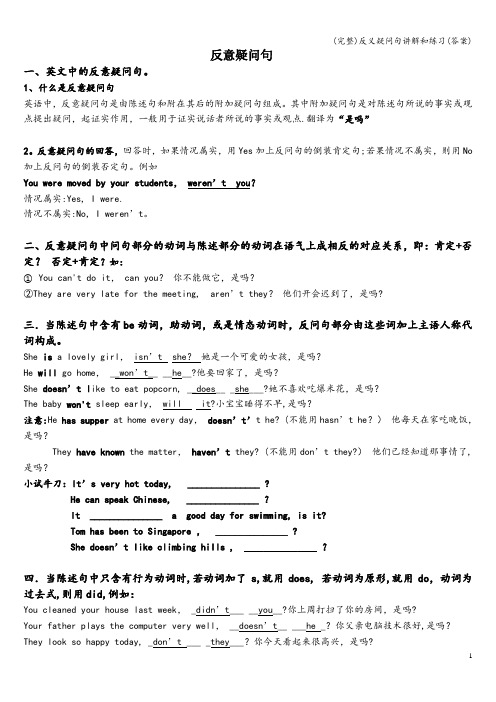
反意疑问句一、英文中的反意疑问句。
1、什么是反意疑问句英语中,反意疑问句是由陈述句和附在其后的附加疑问句组成。
其中附加疑问句是对陈述句所说的事实或观点提出疑问,起证实作用,一般用于证实说话者所说的事实或观点.翻译为“是吗”2。
反意疑问句的回答,回答时,如果情况属实,用Yes加上反问句的倒装肯定句;若果情况不属实,则用No 加上反问句的倒装否定句。
例如You were moved by your students,weren’t you?情况属实:Yes, I were.情况不属实:No, I weren’t。
二、反意疑问句中问句部分的动词与陈述部分的动词在语气上成相反的对应关系,即:肯定+否定?否定+肯定?如:①You can't do it, can you?你不能做它,是吗?②They are very late for the meeting, aren’t they?他们开会迟到了,是吗?三.当陈述句中含有be动词,助动词,或是情态动词时,反问句部分由这些词加上主语人称代词构成。
She is a lovely girl,isn’t she?她是一个可爱的女孩,是吗?He will go home, __won’t__ __he__?他要回家了,是吗?She doesn’t l ike to eat popcorn, __does__ _she___?她不喜欢吃爆米花,是吗?The baby won't sleep early, will it?小宝宝睡得不早,是吗?注意:He has supper at home every day,doesn’t’t he? (不能用hasn’t he?)他每天在家吃晚饭,是吗?They have known the matter,haven’t they? (不能用don’t they?)他们已经知道那事情了,是吗?小试牛刀:It’s very hot today, _______________ ?He can speak Chinese, _______________ ?It _______________ a good day for swimming, is it?Tom has been to Singapore , _______________ ?She do esn’t like climbing hills , _______________ ?四.当陈述句中只含有行为动词时,若动词加了s,就用does, 若动词为原形,就用do,动词为过去式,则用did,例如:You cleaned your house last week, _didn’t___ __you__?你上周打扫了你的房间,是吗?Your father plays the computer very well, __doesn’t__ ___he _?你父亲电脑技术很好,是吗?They look so happy today, _don’t ___ _they___?你今天看起来很高兴,是吗?小试牛刀: Meimei studies in a middle school, _______________ ?He loves cold weather , _______________ ?You finished the task yesterday, _______________ ?五.反意疑问句的陈述部分带有little, few, never, hardly, seldom,nobody, nothing,barely, scarcely等否定意义的词时,问句部分用肯定式.如:①She never tells a lie, does she?(不用doesn’t she?)她从不说谎,是吗?②He was seldom late, was he?(不用wasn’t he?) 他几乎不迟到,是吗?小试牛刀:Few students can answer the question, _______________ ?He can hardly finish his homework, _______________ ?六、反意疑问句的陈述部分为I am……时,问句部分习惯上用aren’t I?表示.如:I am a very honest man, aren’t I? 我是个很诚实的人,是吗?小试牛刀:I’m in Class 3,Grade 2, _______________ ?I’m ten years old, _______________ ?七.陈述部分的主语为不定代词something, anything, nothing, everything时,问句部分的主语用it。
(完整版)反义疑问句详细讲解及习题及答案
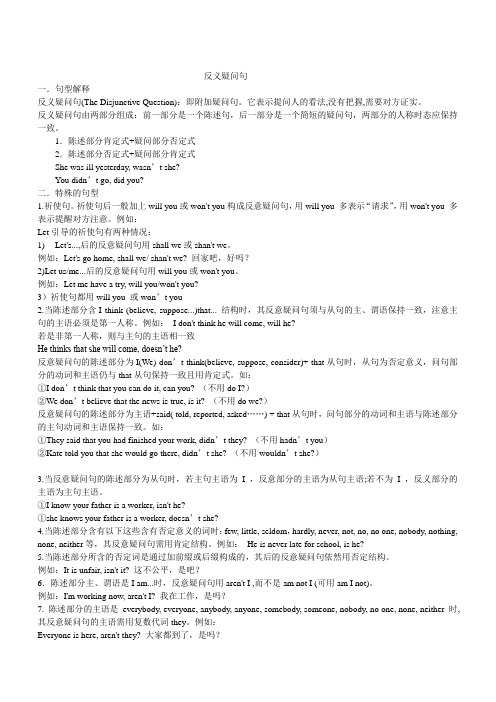
反义疑问句一.句型解释反义疑问句(The Disjunctive Question):即附加疑问句。
它表示提问人的看法,没有把握,需要对方证实。
反义疑问句由两部分组成:前一部分是一个陈述句,后一部分是一个简短的疑问句,两部分的人称时态应保持一致。
1.陈述部分肯定式+疑问部分否定式2.陈述部分否定式+疑问部分肯定式She was ill yesterday, wasn’t she?You didn’t go, did you?二.特殊的句型1.祈使句。
祈使句后一般加上will you或won't you构成反意疑问句,用will you 多表示“请求”,用won't you 多表示提醒对方注意。
例如:Let引导的祈使句有两种情况:1) Let's...,后的反意疑问句用shall we或shan't we。
例如:Let's go home, shall we/ shan't we? 回家吧,好吗?2)Let us/me...后的反意疑问句用will you或won't you。
例如:Let me have a try, will you/won't you?3)祈使句都用will you 或won’t you2.当陈述部分含I think (believe, suppose...)that... 结构时,其反意疑问句须与从句的主、谓语保持一致,注意主句的主语必须是第一人称。
例如:I don't think he will come, will he?若是非第一人称,则与主句的主语相一致He thinks that she will come, doesn’t he?反意疑问句的陈述部分为I(We) don’t think(believe, suppose, consider)+ that从句时,从句为否定意义,问句部分的动词和主语仍与that从句保持一致且用肯定式。
反义疑问句讲解及答案
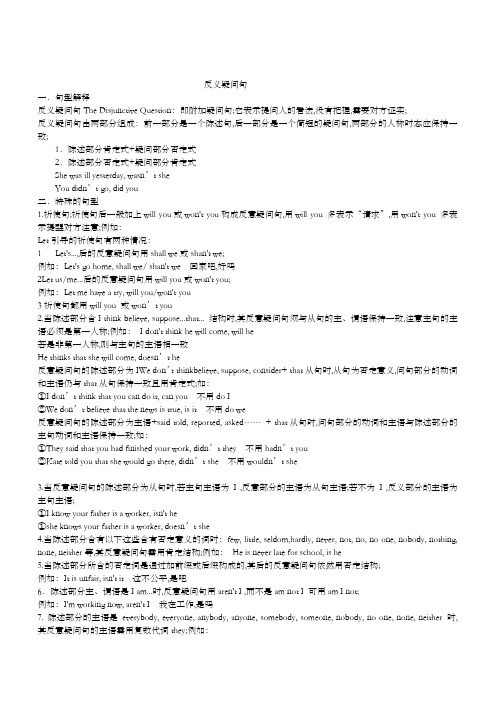
反义疑问句一.句型解释反义疑问句The Disjunctive Question:即附加疑问句;它表示提问人的看法,没有把握,需要对方证实;反义疑问句由两部分组成:前一部分是一个陈述句,后一部分是一个简短的疑问句,两部分的人称时态应保持一致;1.陈述部分肯定式+疑问部分否定式2.陈述部分否定式+疑问部分肯定式She was ill yesterday, wasn’t sheYou didn’t go, did you二.特殊的句型1.祈使句;祈使句后一般加上will you或won't you构成反意疑问句,用will you 多表示“请求”,用won't you 多表示提醒对方注意;例如:Let引导的祈使句有两种情况:1 Let's...,后的反意疑问句用shall we或shan't we;例如:Let's go home, shall we/ shan't we 回家吧,好吗2Let us/me...后的反意疑问句用will you或won't you;例如:Let me have a try, will you/won't you3祈使句都用will you 或won’t you2.当陈述部分含I think believe, suppose...that... 结构时,其反意疑问句须与从句的主、谓语保持一致,注意主句的主语必须是第一人称;例如:I don't think he will come, will he若是非第一人称,则与主句的主语相一致He thinks that she will come, doesn’t he反意疑问句的陈述部分为IWe don’t thinkbelieve, suppose, consider+ that从句时,从句为否定意义,问句部分的动词和主语仍与that从句保持一致且用肯定式;如:①I don’t think that you can do it, can you 不用do I②We don’t believe that the news is true, is it 不用do we反意疑问句的陈述部分为主语+said told, reported, asked……+ that从句时,问句部分的动词和主语与陈述部分的主句动词和主语保持一致;如:①They said that you had finished your work, didn’t they 不用hadn’t you②Kate told you that she would go there, didn’t she 不用wouldn’t she3.当反意疑问句的陈述部分为从句时,若主句主语为I ,反意部分的主语为从句主语;若不为I ,反义部分的主语为主句主语;①I know your father is a worker, isn't he①she knows your father is a worker, doesn’t she4.当陈述部分含有以下这些含有否定意义的词时:few, little, seldom,hardly, never, not, no, no one, nobody, nothing, none, neither等,其反意疑问句需用肯定结构;例如:He is never late for school, is he5.当陈述部分所含的否定词是通过加前缀或后缀构成的,其后的反意疑问句依然用否定结构;例如:It is unfair, isn't it 这不公平,是吧6.陈述部分主、谓语是I am...时,反意疑问句用aren't I ,而不是am not I 可用am I not;例如:I'm working now, aren't I 我在工作,是吗7. 陈述部分的主语是everybody, everyone, anybody, anyone, somebody, someone, nobody, no one, none, neither 时, 其反意疑问句的主语需用复数代词they;例如:Everyone is here, aren't they 大家都到了,是吗No one knows about it, do they 没有人知道这件事,对吗8.陈述部分的主语是everything, nothing, anything或something 时,反意疑问句的主语应用代词it;例如:Something is wrong with my radio, isn't it我的收音机出毛病了,是吧9.陈述部分的主语是指示代词this或that时,反意疑问句的主语用it,当陈述部分的主语是指示代词these或those 时,其反意疑问句的主语用they;例如:This is a plane, isn't it 这是一架飞机,是吗These are grapes,aren't they 这些是葡萄,是吗10.陈述部分的主语是不定代词one时,反意疑问句的主语可以用one,也可用you;例如:One should be ready to help others, shouldn't one每个人都应该乐于助人,是吧11. 当陈述部分谓语动词是need, dare,且这些词被用作实义动词时,其反意疑问句需用do的适当形式;例如:He needs help, doesn't he 他需要帮助,是吗12.当陈述部分主语是从句、不定式短语、动词-ing形式时,反意疑问句的主语应该用it;例如:What you need is more important, isn't it你需要的东西更重要,是吧12.havehas不是表示“有”的意思,并在句中做谓语时,其反意疑问句的助动词要用do, does, did;例如:They had a meeting just now,didn't they他们刚才开了个会,是吗15.陈述部分有have to 时,其反意疑问句要用助动词的否定形式;例如:You have to water the vegetables every day, don't youYou had to water the vegetables every day, didn't you16.He used to stay up late, usedn’t he/ didn’t he17.陈述部分是there be句型时,其反意疑问句中要用there;There was a hospital here, wasn't there18.陈述部分有had better时,反意疑问句中要用hadn't;例如:We’d better go to school at once, hadn't weHe’d rather go home, wouldn’t he19.当陈述部分含有情态动词must时,我们便要分析一下must的含义;如果must 作“一定;要;必须”讲,反意疑问句须用mustn't或needn't;而当must作推测意义“一定是;必定”讲时,反意疑问句则需根据must后的动词原形选用相应的形式;例如:He must work hard at physics, mustn't he他必须努力学物理,是吧Tom must be at home,isn't he 汤姆一定在家,是吧①He might have forgotten his pen in the classroom yesterday, didn’t he不用mightn’t he / hasn’t he②You must have got up late this morning, didn’t you 不用mustn’t you /haven’t you20.反意疑问句的回答用yes, no, 但是,回答意思相反,当陈述部分是否定形式时,回答要按事实;例如:They don’t work hard, do theyYes, they do. 不,他们工作努力;/No, they don’t. 对, 他们工作不努力;反意疑问句的陈述部分为I am……时,问句部分习惯上用aren’t I 表示;如:I am a very honest man, aren’t I反意疑问句练习1. I suppose the shoes will last you at least one year, ____________A. won’t theyB. will theyC. do ID. don’t2. Everyone is surprised at the news, _____________A, is he B. are they C. aren’t they D. is not he3. ----- You will come to have dinner with us, won’t you----- ____________A. Excuse me, I won’t.B. I haven’t been there.C. You are welcome.D. Yes. That’s very nice of you.4. Tom isn’t a hard-working student, for it is the third time he has been late, ______________A. wasn’t itB. hasn’t itC. isn’t itD. hasn’t he5. You don’t have to go school on Sundays, _____________ youA. haveB. doC. shouldD. would6. I don’t think he had his supper at the school, _____________A. had heB. did heC. do ID. don’t you7.I don’t think he’d like to take such a difficult job, __________A. had heB. would heC. do ID. don’t you8. I don’t think her passport’s gone, __________A. is itB. has sheC. do ID. don’t you9. Do pay attention to my work and keep your eyes open all the time, ____________A. will youB. don’t youC. shall weD. won’t we10. All the drivers dislike driving on the narrow roads ________________A. don’t theyB. don’t each of themC. do ID. don’t you11. Let’s go and have a walk,___________A. doB. shallC. haven’tD. shan’t12. Go and fetch a chair for him, ___________A. don’t youB. shall youC. won’t youD. will you13. There used to be a shop behind the factory, ________________A. didn’t thereB. used thereC. usedn’t it C. didn’t it14. I’m sure he must have been sleeping at the moment, __________A. aren’t I B, mustn’t C. wasn’t he D. hasn’t15. I had to tell the truth, __________A. hadn’t IB. wouldn’t IC. didn’t ID. shouldn’t I16.------- Why is Tom absent now-------He must be sick,________________A. isn’t heB. must heC. is heD. mustn’t he17, He’d like to have a look at your picture,_________-heA. hadn’tB. didn’t C .couldn’t D .wouldn’t18. You don’t think he will come,_________A. do youB. will youC. will heD. won’t he19. Let’s go home, shall we _________.A. That’s right.B. That’s allC. That’s all rightD. All right20. Jack had dinner with his mother at home yesterday,A. didB. doesC. didn’tD. hadn’t21. Let John finish the work all by himself,___________A. shall weB. will youC. do youD. do we22.I don’t think it is going to rain, _____________ itA. do IB. do youC. isD. isn’t23. Nothing the boy did was right, _______ itA. wasB. didC. wasn’t C. didn’t24. It’s the first time that she has been to the United States, ____________A. isn’t sheB. isn’t itC. hasn’t sheD. hasn’t it25. He was hardly able to stand on his feet after the car accident,__________ heA. couldB. couldn’tC. wasD. wasn’t26. Jack seldom goes to the park, _______________A. does heB. doesn’t heC. does JackD. doesn’t Jack27. People use tag question 反意疑问because they are not sure of what they have said _____________theyA. doB. didC. didn’tD. don’t28. Everyone wants to be chosen for the work, ____________A. isn’t heB. does heC. don’t theyD. do they29. She is going to see you ,_________ sheA. isn’tB. isC. don’tD. doesn’t30. They used to live in these mountain areas ,_____________ theyA. didB. didn’tC. usedD. weren’t31. He ought to go by plane, _____heA. shouldn’tB. wouldn’tC. shouldD. would32. Lovely weather ___________A. Yes. You are right.B. Yes ,isn’t itC. No, it isD. No, you are wrong33. ---------- You must do as I tell you.----------Oh, I must, ____________IA. shouldB. mustn’tC. oughtD. must34. We must start earlier,__________ weA. needn’tB. mustn’tC. don’tD. mustn’t35. You must have studied English for many years, _________ youA. didn’tB. haven’tC. needn’tD. mustn’t36. She must have arrived there yesterday, __________ sheA. didn’tB. hasn’tC. needn’tD. mustn’t37. We mustn’t be late, __________ weA. mustB. mayC. areD. A&B38, I needn’t show her the keys to the question, ________ IA. mustB. needC. canD. do39. We need to practice speaking English more often, ___________ weA. mustn’tB. needn’tC. can’tD. don’t40. I have to work this afternoon,__________ I A. don’t C, haven’t D. doKEY. 1--10 ACDCB BBAAA 11-20 BDACC ADADC21-30 BCABC ADCAB 31-40 ABDAB ADBDC。
- 1、下载文档前请自行甄别文档内容的完整性,平台不提供额外的编辑、内容补充、找答案等附加服务。
- 2、"仅部分预览"的文档,不可在线预览部分如存在完整性等问题,可反馈申请退款(可完整预览的文档不适用该条件!)。
- 3、如文档侵犯您的权益,请联系客服反馈,我们会尽快为您处理(人工客服工作时间:9:00-18:30)。
反义疑问句1.(06广东)Sarah had her washing machine repaired the day before yesterday,___she?A.hadB.didC.hadn’tD.didn’t2.(04上海)You had one of your teeth pulled out yesterday,___ you?A.hadB.hadn’tC.didD.didn’t3.(04上海)Bill’s aim is to inform the viewers that cigarette advertising on TV is illegal,___?A.isn’t itB.is itC.isn’t heD.is he4.(05上海)There was a loud scream from the backstage immediately after the concert ended,___?A.wasn’t thereB.was thereC.didn’t thereD.did it5.(07北京)When you’ve finished with that book,don’t forget to put it back on the shelf,___you?A.doB.don’tC.willD.won’t6.(06全国)We forgot to bring our tickets,but please let us enter,___?A.do youB.don’t youC.will youD.won’t you 含有情态动词must的反义疑问句当陈述部分带有情态动词must时,疑问部分要根据must的意思不同而有所变化。
如果must表示“必须”或“有必要”时,疑问部分用needn’t,如果陈述部分用mustn’t表示禁止时,疑问部分一般用must。
eg.You must go there,needn’t you?You mustn’t go there,must you?如果must表示“一定”等推测意义时,则疑问部分不用must,而要根据must后面的动词结构及含义使用相应的动词时态。
eg.You must be tired,are you?You must have watched that football match last night,didn’t you?7.(04上海)There is no light in the dormitory.They must have gone to the lecture,___they?9.(06上海)He told you that there wasn’t anymore in the room at that time,___?A.was thereB.wasn’t thereC.didn’t heD.did he10.(06福建)I’m sure you’d rather she went to school by bus,___?A.hadn’t youB.wouldn’t youC.aren’t ID.didn’t sheeg. I don't believe that he can translate this book, can he?2)当主句的主语为第二、三人称时,其后的简短问句则应与主句相一致(此时,否定只看主句,与从句无关...)。
eg.Your sister supposes she needs no help, doesn't she?You thought they could have completed the project, didn't you?11.-You must do as I tell you.-Oh,I must,___I?A.shouldB.oughtC.mustn’tD.must解析:这是个特殊的反义疑问句,为同向单向反义疑问句,有点不满的情绪,选D。
反意疑问句练习1. You'd rather watch TV this evening, ______?a. isn't itb. hadn't youc. wouldn't youd. won't you2. I suppose you're not going today, ______?a. are youb. do youc. don't youd.aren't you3. I wish to shake hands with you, ______?a. shallb. may Ic. do Id. will I4. Three hours ought to be enough time, ______?a. oughtn't three hoursb. didn't theyc. shouldn't itd. shouldn't three hours5. They have to study a lot, ______?a. don't theyb. haven't theyc. did theyd. hadn't they6. When the car crashed, your brother escaped being hurt, ______ ?a. didn't heb. did hec. did itd. didn't it7. I'm sure dirty, ______?a. am Ib. isn't Ic. aren't Id. am not I8. You seem to be dissatisfied with your present post. I don't think you judged your ability objectively when you applied for it, ______ you?a. dob. didc. don'td. didn't9. That's the sort of the book you want, ______?a. is itb. isn't thatc. is thatd. isn't it10. All these dictionaries are a great help to you, ______?a. are theyb. aren't theyc. are all these dictionariesd. aren't all these dictionaries11. The movie that we saw last week was quite interesting, ______?a. wasn't itb. was itc. didn't wed. weren't we12. Tom has been writing letters all afternoon, but he should have finished them by now, _____?a. hasn't heb. has hec. shouldn't hed. didn't you13. David told me that you would take a trip to America, ______?a. would youb. wouldn't youc. did youd. didn't you14. There appeared to be no better way, _______?a. was thereb. were therec. did thered. didn't there15. You had some trouble finding where I live, ______?a. didn't youb. hadn't youc. do Id. don't I16. He has his hair cut every month, ______?a. has heb. hasn't hec. does hed. doesn't he17. Your friend needs to come earlier, ______?a. does heb. doesn't hec. need hed. needn't he18. The little boy dare not go to church, ______?a. dare heb. daren't hec. does hed. doesn't he19. Susan would have worked abroad if she'd had the chance, ______?a. has sheb. hadn't shec. would shed. wouldn't she20. Everyone's having a good time, ______?a. is heb. isn't everyonec. does hed.aren't they21. Any one can join the club, ______?a. can any oneb. can't any onec. can't theyd. can they22. Tell me how to operate the electronic computer, ______?a. will youb. shan't youc. do youd. don't you23. Magaret scarcely comes to visit you on Christmas Day, ______?a. doesn't sheb. does shec. do youd. don't you24. Let's listen to the radio program that the teacher mentioned, ______?a. do web. don't wec. shall wed. shan't we25. You think you're funny, ______?a. didn't youb. are youc. don't youd. do you26. Janet used to take part in labor in that village, ______?a. used sheb. did shec. didn't shed. should she27. What beautiful weather, ______?a. is itb. isn't itc. won't itd. doesn't it28. He ought to go to Kwangchow by plane, ______?a. should heb. shouldn't hec. would hed. wouldn't he29. We never dared to ask him a question, ______?a. did web. didn't wec. dared wed. daren't we30. Nobody will believe how difficult his work has been ______?a. will heb. won't nobodyc. will theyd. won't they31. You must have made the mistake, ______?a. mustn't youb. haven't youc. didn't youd. hadn't you32. Learning how to repair computers takes a long time, ______?a. isn't itb. aren't theyc. doesn't itd. don't they33. Jack has coffee with breakfast, ______?a. hasn't Jackb. hasn't hec. doesn't Jackd. doesn't he34. They must have stayed at hotel last night, ______?a. mustn't theyb. haven't theyc. didn't theyd.hadn't they35. There isn't anything wrong with the radio, ______?a. is thereb. is itc. does itd. does there36. You must be hungry, ______?a. must youb. mustn't youc. are youd.aren't you37. Let's do the exercises by ourselves, ______?a. shall web. shan't wec. will youd. will we38. Her daughter had the carpets and curtains cleaned, ______?a. had sheb. hadn't shec. didn't shed. didn't her daughter39. The teacher had a talk with you, ______?a. has youb. hadn't shec. did shed. didn't she40. Something'll have to be done about the air pollution, ______?a. won't itb. will itc. has itd. does it真题答案:DDAAC CDCCB D反意疑问句练习答案1-5 CABCA 6—10 ACBDB 11—15 ACBDA 16—20 DBADD21—25 CABCD 26—30 CBBAC 31—35 BCDCA 36--40 CACDA。
